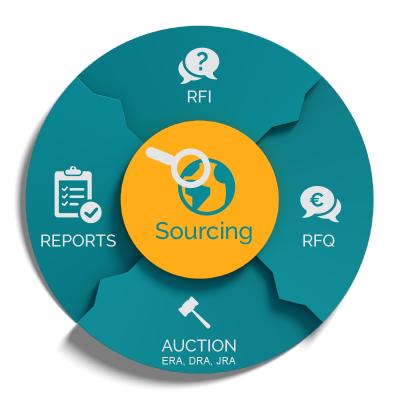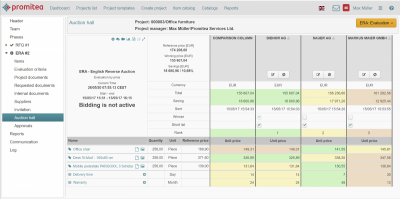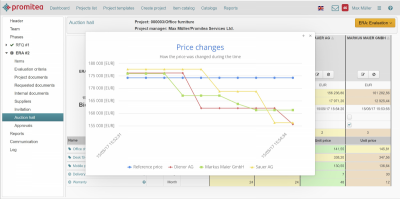Sourcing

Promitea streamlines queries, tenders and auctions when purchasing leverage products, which on average account for more than 50% of a company's total procurement value. Promitea yields:
- Intuitive user guidance for rapid implementation.
- Relief for strategic buyers from routine tasks.
- Shorter processing times with process cost reductions of up to 45%.
- Minimization of purchase prices by 5 - 15%.
The essential in four minutes
RFI - Request for Information
RFI defines the general conditions of the purchasing process on the basis of the requirement request of the technical department. With the request description, RFI electronically invites any number of suppliers to submit their first bid information.
Promitea automatically evaluates the incoming bids from the suppliers and thus provides the basis for the next steps of the project with the suppliers who have qualified for the shortlist.
RFQ - Request for Quotation
 RFI extends the results from an RFI to an RFQ.
RFI extends the results from an RFI to an RFQ.
Alternatively, you can use an RFQ to start the purchasing process directly on the basis of a requirements request.
An RFQ is usually more detailed than an RFI, and includes a description of the requested products, non-monetary criteria and attached documents.
Promitea RFQ automatically evaluates incoming bids.
To streamline project preparation, earlier project data can be copied and/or transferred from existing templates, saving time and effort.
ERA - English Reverse Auction
 An ERA follows an RFQ as an additional negotiation method of purchasing leverage products.
An ERA follows an RFQ as an additional negotiation method of purchasing leverage products.
During an ERA all defined criteria are considered simultaneously, not only the prices.
The customer can either evaluate the total bids or evaluate the individual items with the "Cherry Picking" option.
An ERA runs as an online auction for a period of approx. 30 minutes. If required, the customer can extend the time length.
TCO and cost drill down auctions are also available as alternatives.
DRA - Dutch Ticker Reverse Auction
A DRA is a very efficient and easy auction form to conduct. It starts with an unrealistically low price. In the course of the auction, the system increases the price in predefined steps and intervals. The suppliers observe the price development.
If the first supplier accepts the current price at the touch of a button, he is the winner of the auction.
A more stringent version of DRA doesn’t stop after this acceptance, but starts to run in the opposite direction by presenting lower prices. All suppliers have the chance to accept the lower prices. Whoever ends up the last supplier is the winner.
JRA - Japan Ticker Reverse Auction
A JRA is also a very efficient and easy auction to conduct. It starts with an unrealistically high price set by the customer. The system lowers the price in predefined steps and intervals.
The suppliers monitor the price development and have to confirm the acceptance by pressing a button. This keeps them in the game, and as the price falls, the less competitive suppliers leave the auction. The last one to accept the actual price is the winner of the auction.
Reports & Compliance
The results of RFI, RFQ and different auctions are separately summarized for customers and suppliers in logs and standard reports and distributed electronically.
The report results are part of the supplier evaluation in the SRM module.
Tools for Business Intelligence are available for further analysis of the results. You can use them to forecast future developments and carry out cross-system evaluations, such as Spend Analysis.
All system inputs of all participants and achieved results are archived and made available in log protocols. This provides the seamless monitoring of all steps in the process and enables the abidance by compliance rules defined by the customer.



